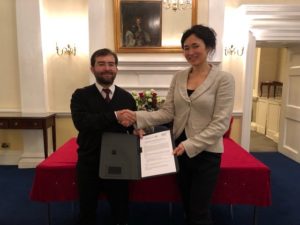The aim of partnership is to generate sustainable recovery and reconstruction in war-torn countries in the Middle East and North Africa, says Head, WorldGBC’s MENA Regional Network

Mohammad Asfour, Head, WorldGBC’s MENA Regional Network, and Glada Lahn, Senior Research Fellow, Energy, Environment and Resources, Chatham House, with the MoU
London, United Kingdom, 11 December 2018: The World Green Building Council (WorldGBC) Middle East and North Africa (MENA) Region and Chatham House (the Royal Institute of International Affairs) have signed a Memorandum of Understanding to commence efforts to encourage reconstruction efforts that foster environmental and social sustainability in war-torn countries across MENA, the two institutions announced in a joint Press communiqué.
Urban areas and essential infrastructure across Syria, Iraq, Yemen, Libya and Gaza have suffered large-scale damage and destruction due to multiple, recent and ongoing conflicts, the communiqué said. These countries also face severe levels of water stress and environmental degradation overlaid by climate change, the communiqué further said. Extreme temperatures, coupled with lack of access to power, are already exacerbating inequalities across the region, the communiqué also said. Reconstruction is likely to take place in a vacuum of environmental regulation, reducing countries’ long-term prospects for the inclusion of returnees, social stability and economic recovery, the communiqué added.
Estimates suggest that over USD 560 billion will be needed across the region just to repair and rebuild what was previously there, the communiqué said. Rebuilding allows the opportunity to benefit from the latest practices, materials and technologies adapted to a country’s specific climatic conditions and social fabric, the communiqué further said. Internationally agreed guidelines and principles and the capacity to apply them within both the construction industry and donor and finance institutions is essential, to raise the level of accountability in this area, the communiqué added.
This initial one-year knowledge and cooperation partnership will focus on developing a strong plan to research and raise awareness of past experience, local cultural practices and inspiring adaptive examples; coupled with intensive cross-sector dialogue to develop geographically appropriate principles and practical guidelines for sustainable post-conflict reconstruction, the communiqué said.
According to WorldGBC MENA Region and Chatham House, the two institutions will collaborate to:
The initiative will facilitate unprecedented engagement and consultation among experts and decision-makers on this topic, the communiqué said. Research and recommendations will be grounded in local knowledge with a handpicked team of experts and advisors inside and outside the region including: the water-energy nexus and reconstruction specialists at the Issam Fares Institute, Lebanon, multilateral development bank practitioners and construction, urban planning and civil engineering expertise accessed through the MENA country chapters of the WorldGBC, the communiqué further said.
Mohammad Asfour, Head, WorldGBC’s MENA Regional Network, said: “We are delighted to commence this partnership between the WorldGBC MENA Region and Chatham House. This collaboration will lay the essential groundwork for a regional agenda for sustainable recovery and reconstruction, in which the re-built environment contributes to healthy, resource-secure and climate-resilient societies.”
Glada Lahn, Senior Research Fellow, Energy, Environment and Resources, Chatham House, said: “Rebuilding to meet the needs of societies recovering from conflicts in the Middle East and North Africa is a momentous international challenge. But it also presents an opportunity to increase water and energy security and improve resilience to climate change across the region, thus fostering peace and development. We look forward to working together to achieve these goals.”
The communiqué said, the project will partner with practitioners working on the ground on recovery and reconstruction, including UN Habitat, the United Nations Environment Programme (UNEP), the International Committee of Red Cross and Red Crescent and local municipalities to ensure that the project draws on first-hand knowledge and has practical application.
Copyright © 2006-2025 - CPI Industry. All rights reserved.